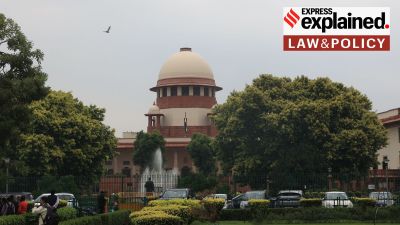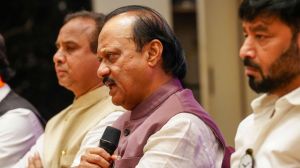The turmoil within
The lotus grows out of muck. It is the symbol of the BJP. It is also symbolic of the BJP's present problem. Remove the muck and the lotus...

The lotus grows out of muck. It is the symbol of the BJP. It is also symbolic of the BJP8217;s present problem. Remove the muck and the lotus withers. Remove the sangh parivar will not the lotus wither?The rift between the parivar and its political front, the BJP, widens and deepens. Atal Behari Vajpayee is not a born-again Congressman.
He was spawned by the RSS. Yet, as Prime Minister of a rag-tag coalition, he cannot push the Hindutva agenda. To do so would be to commit hara-kiri. In that case, asks the parivar, what is the point of political power if it means abandoning the cause for which we sought political power?
The rumpus over Bihar Governor S.S. Bhandari illustrates the conundrum star-kly. Bhandari saw no reason to abandon his larger purpose merely to secure accommodation in a Raj Bhawan. Part of his larger agenda was to end the godless rule of an avowed secularist, the better to usher in a Hindu dawn. Bhandari, however, is an ideologue, not a practiced politician.
So, he did not see that turfingLaloo and his good wife, Rabri, out of the Patna Secre-tariat did not mean bringing in himself or his kind. For the BJP can hope to cash in on the Bihar opportunity only if it places itself in the hands of Nitish Kumar8217;s Kurmi rivals to Laloo8217;s Yadavas. They know the cry of Jai Shri Ram will not get the BJP the votes that matter. And Nitish Kumar is quite as godless a secularist as Laloo. Hence, the BJP politicians quickly deferred to Nitish Kumar8217;s political imperative: bring in a governor who will help us win the coming state assembly election.
Home Minister L.K. Advani, who knows how to keep the heavenly Lord in abeyance when more earthly matters intervene, quickly saw the point and readily obliged. Only, he chose to say, with exquisite indelicacy, that Bhandari should go to make way for an apolitical8217; alternative. Bhandari regards himself as sup-remely above the dross of politics. No wonder he took offence at being categorised as not apolitical8217; 8212; what P.G. Wodehouse would have called 8220;thepetrification of the implied opposite8221;. Like Draupadi beseeching Krishna, Bhandari demands justice.
Bhandari is not alone. Dattopant Thengadi, the RSS leader of the Hindutva trade union movement, has castigated Vajpayee8217;s government, and Vajpayee personally. The Swadeshi Jagran Manch is furious at the government8217;s betrayal of swa-deshi8217;. It is no concern of theirs that turning the economy inwards, at the precise juncture when it is gasping for a breath of exports and foreign investment, is just what would enable finance minister Yashwant Sin-ha to repeat his 1991 turn of sending the eco-nomy, for the second successive time, into an economic Black Hole.
The Vishwa Hindu Parishad, for its part, has held at Ahmedabad a Dharmasansad Parliament of Religion or Righteousness where the VHP8217;s 8220;MPs8221;, its sants and sadhus, have severely castigated Vajpayee for putting the Hindutva agenda on the back-burner. That any such move will bring the house of cards tumbling down is of no concern to the VHP.
TheBajrang Dal, for its part, is a law unto itself and resents the suggestion that upholding the law is the business of government. Whatever might be the Cons-titutional position on matters like freedom of religion, it is on the muscle of the Bajrang Dal that organisations like the Hindu Jagaran Manch are targeting Christian tribals and missionaries working among them. It is, of course, no concern of the Dal or the Manch that continued Christian-bashing is more likely than even raising food prices in ration shops to send the government crashing down.
As for the high priests of Hindutva, the RSS unburdened itself last December of what it deeply believes are the anti-Hindu failings of the government. Vajpayee8217;s sharp response at the BJP8217;s National Executive meeting in Bangalore only added insult to injury. The RSS has got used to BJP politicians like Vajpa-yee consulting with th-em, deferring to them.
Now that Vajpayee has made it to the top, and has no further ambition to nurse, he is attempting to kick theladder up which he has climbed. Indeed, to give himself the required room for manoeuver, he first tri-ed to cut himself off fr-om even the wrestling akhara known as the co-alition8217;s coordination committee. When that backfired, he bought coalition support by acquiescing in a coordination committee resolution that targeted the parivar. That, of course, has left the parivar incandescent with fury.
The sangh parivar8217;s fundamental demand is that they must have a say in government policy. Vajpayee resists it for the same reason that he resists the coordination committee8217;s attempts at ingressing on policy, namely, that there is so little in common between the coalition partners and the BJP, and now between the main ruling party and its support base, that coordinating matters with either the partners or the support base is only going to add to delay and confusion.
Vajpayee has survived the first two months of this siege. But the battle between the BJP and the RSS has been joined. Delhi8217;s Madan Lal Khurana hasfired the first thundering volley. There has been some small arms fire with the first two or three BJP MPs attacking their Prime Minister for attacking the parivar.
Many more guns will boom in this internecine war, especially once controversial parliamentary business like the new insurance policy and the Patents Bill, not to mention the Women8217;s Reservation Bill, possibly even the ordinance dismissing the Bihar government, come up for debate and resolution. The problems Vajpayee has with his ilk can for a while be masked behind the euphoria of his bus journey to Pakistan. But how often can he run to Lahore to escape his dilemmas at home?
Vajpayee must learn, and if he does not will be taught soon, that back-bench BJP MPs have well understood the searing lesson of the elections in Delhi, Rajasthan and Madhya Pradesh last November. Disillusioned with Vajpayee8217;s marginalisation of the Hindutva programme, the RSS cadres refused to campaign in the elections, even though close to 50,000 of them had been gatheredat Meerut on the eve of the voting so as to unleash them and their notorious works on the electorate. Without the RSS, the BJP was reduced to a cipher. As another mid-term poll looms, many a BJP MP will be wondering whether a Vajpayee without the RSS is not like a shakha without khaki knickers. That is when the government will fall.
Aiyar is a Congress party official but these views are his own
- 01
- 02
- 03
- 04
- 05































